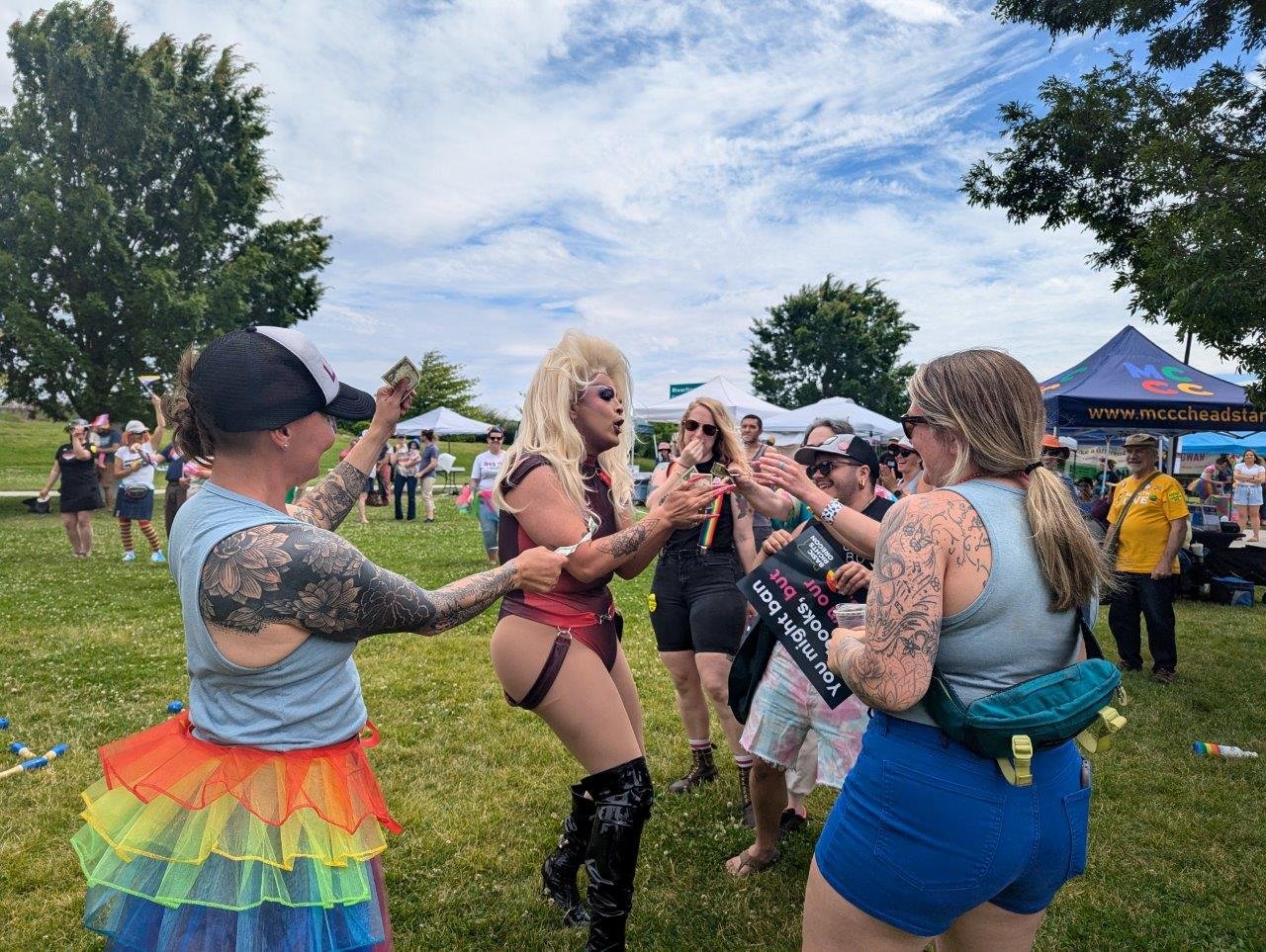Photo Gallery: Pride in The Dalles
By Cole Goodwin
The Dalles, Ore, July 1, 2024 – Columbia Gorge Pride Alliance (CGPA) celebrated LGBT Pride Month in downtown The Dalles on Saturday, June 29. Hundreds flocked to the event to enjoy celebrating LGBTQ resilience and the fight for equal rights. The event began with a Pride march down 2nd st and ended at Lewis and Clark Festival Park with a resource fair, Yoga with Kai and a drag show featuring Aspen Meadows, Lilac, and JayJay.
Drag Queens thanked The Dalles and the community for coming out to enjoy the show.
“Keep showing love every chance you get,” said one performer.
The event was something of a finale for the CGPA’s 30 Days of Gay program for 2024. (Although if you missed it, never fear! Other Pride events organized by Goldendale Pride Alliance will occur in July.)
“This month has been wild, it’s been busy basically every day. I think the thing I’m most proud of is this (The Dalles Pride event), just the turnout and the community support we’ve gotten this year has been super awesome and I couldn’t ask for more,” said Kit Classen, CGPA Program Director for The Next Door.
CGPA and their partners provided free water, stickers, buttons, flags, clothing, snow cones, face painting, a bounce house, games, and more at the event. CGPA staff and volunteers were also on hand to answer questions about resources and future events and to hand out printouts of the CGPA’s 2023 Community Needs Assessment results which were conducted in March and April of 2023.
The needs assessment surveyed 188 people and held two listening sessions to help paint a picture of the Gorge’s Queer Community.
Demographics:
75% of respondents were White, 14% as Hispanic, 5% as African American or Black and 3% as native American or Indigenous and 3% as Aisian or Asian American.
The assessment found that 48% of participants were female, 21% nonbinary, 16% male, 10% agender, 2% gender neutral, and 2% two spirit.
29% of respondents identified as bisexual, 23% as gay or lesbian, 20% as queer, 19% as pansexual, 6% as asexual, and 3% as unsure or questioning.
56% percent of respondents were under the age of 18.
Key findings:
Most stated that they feel connected to the Gorge community some of the time.
Only half of the LGBTQIIA+ people plan to stay in the Gorge. The top reason for leaving was a lack of queer community and support.
Respondents under 21 years of age were least likely to stay in the Gorge.
Respondents 40 and older stated family, owning a home and career as their top reasons for staying.
When asked about accessing resources in the Gorge, respondents said about 40% of resources were affirming and about 60% were non-affirming.
The most common barriers to accessing resources were: not knowing who to talk to, cost, transportation, fear someone would find out, fear of being reported to ICE, and language barriers.
Between 3.5% and 7% of LGBTQ+ youth under 18 had reported substance use in the past 30 days, which was “on par” with rates of substance use for students in the region by comparing results to the 2022 Columbia Gorge Regional Health Needs Assessment.
68% of cisgender and non-transgender respondents said they always felt safe and supported at home compared to 48% of transgendergender students said they always felt safe and supported at home.
70% of cisgender and non-transgender respondents said they always had a safe person to talk to compared to 54% of transgender respondents.
35% of cisgender and non-transgender respondents said they always felt safe and supported at school, whereas only 20% of transgender respondents said they always felt safe and supported.
47% of cisgender and non-transgender respondents said they always felt safe and supported at work whereas only 21% of transgender respondents said they always felt safe and supported.
63% of cisgender and non-transgender respondents reported that they always had a sage palace to go in the Gorge whereas 37% of transgender respondents said they always had a safe space to go.
Only 15% of both cis and transgendergender respondents said they always felt comfortable being as “out” as they wanted.
“Respondents stressed the need for complete systemic change in health care as well as mental health care. These need to be LGBTQ2SIA+ affirming, affordable, and accessible,” reads the assessment.
The assessment also suggested ways that organizations, businesses, and schools could improve the quality of life for the LGBTQ+ community in the future.
Suggestions included: having gender neutral restrooms, using inclusive language on paperwork, providing inclusive education and training for staff, more LGBTQ2SIA spaces and events, and visible flags and other signs of support. The assessment also drew the conclusion that family and friends of queer folks generally need more education on LGBTQ+ issues, respecting names and pronouns and how to listen to LGBTQ+ voices.
Support Local News
Available for Everyone; Funded by Readers














